
Douglass Rupert Dumbrille was a Canadian actor who appeared regularly in films from the early 1930s.
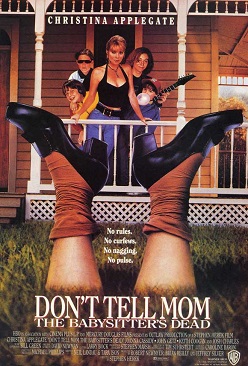
Don't Tell Mom the Babysitter's Dead is a 1991 American coming-of-age black comedy film directed by Stephen Herek, written by Neil Landau and Tara Ison, and starring Christina Applegate, Joanna Cassidy, Keith Coogan, John Getz, and Josh Charles. The plot focuses on a 17-year-old girl who assumes the role as head of the house when the elderly babysitter whom her mother had hired to watch over her kids while she is in Australia suddenly dies.

Edwin Eugene Lockhart was a Canadian-American character actor, playwright, singer and lyricist. He appeared and over 300 films, and received an Academy Award nomination for Best Supporting Actor for his role as Regis in Algiers (1938), the American remake of Pepe le Moko.

Travers John Heagerty, known professionally as Henry Travers, was an English film and stage character actor. His best known role was the guardian angel Clarence Odbody in the 1946 film It's a Wonderful Life. He also received an Academy Award nomination for his supporting role in Mrs. Miniver (1942). Travers specialized in portraying slightly bumbling but amiable and likeable older men.

The Five Little Peppers is a book series created by American author Margaret Sidney which was published 1881 to 1916. It covers the lives of the five children in their native state and develops with their rescue by a wealthy gentleman who takes an interest in the family.

The Man with a Cloak is a 1951 American film noir crime-thriller-drama directed by Fletcher Markle and starring Joseph Cotten, Barbara Stanwyck, Louis Calhern, and Leslie Caron, and based on "The Gentleman from Paris", a short story by John Dickson Carr.

The Rescue, A Romance of the Shallows (1920) is one of Joseph Conrad's works contained in what is now sometimes called the Lingard Trilogy, a group of novels based on Conrad's experience as mate on the steamer Vidar. Although it was the last of the three novels to be published, after Almayer's Folly (1895) and An Outcast of the Islands (1896), the events related in the novel precede those. The story follows Captain Tom Lingard, the recurring protagonist of The Lingard Trilogy, who was on his way to help a native friend regain his land when he falls in love with a married woman whose yacht he saves from foundering.

The Prairie: A Tale (1827) is a novel by James Fenimore Cooper, the third novel written by him featuring Natty Bumppo. His fictitious frontier hero Bumppo is never called by his name, but is instead referred to as "the trapper" or "the old man". Chronologically The Prairie is the fifth and final installment of the Leatherstocking Tales, though it was published before The Pathfinder (1840) and The Deerslayer (1841). It depicts Natty in the final year of his life, still proving helpful to people in distress on the American frontier. The book frequently references characters and events from the two books previously published in the Leatherstocking Tales as well as the two which Cooper would not write for more than ten years. Continuity with The Last of the Mohicans is indicated by the appearance of the grandson of Duncan and Alice Heyward, as well as the noble Pawnee chief Hard Heart, whose name is English for the French nickname for the Delaware, le Coeur-dur.
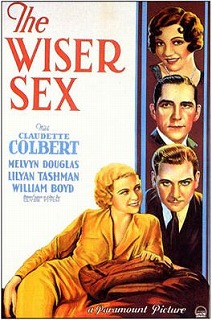
The Wiser Sex is a 1932 American pre-Code crime drama film directed by Berthold Viertel and Victor Viertel and starring Claudette Colbert, Melvyn Douglas, Lilyan Tashman, William "Stage" Boyd and Ross Alexander. Made by Paramount Pictures, its working title was The Weaker Sex.
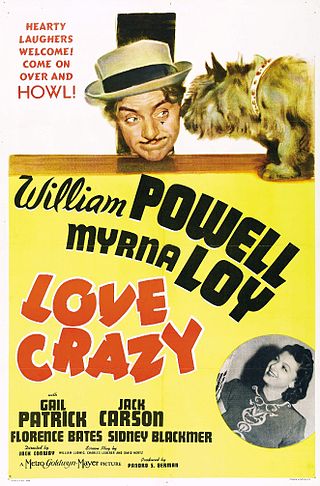
Love Crazy is a 1941 American Jack Conway screwball comedy film directed by pairing William Powell and Myrna Loy as a couple whose marriage is on the verge of being broken up by the husband's old girlfriend and the wife's disapproving mother. This was their eleventh of fourteen films appearing together. The supporting cast include Gail Patrick, Jack Carson and Sig Ruman.
The Cockeyed Cowboys of Calico County is a 1970 American comedy Western film by Universal Studios, directed by Anton Leader and Ranald MacDougall, and starring Dan Blocker and Nanette Fabray, with a supporting cast featuring Jim Backus, Mickey Rooney, Wally Cox, Jack Elam, Noah Beery, Jr. and Don "Red" Barry. MacDougal wrote the screenplay. It was originally made as a television film but the decision was made to release it to movie theaters.

Fast Company is a 1938 American mystery film directed by Edward Buzzell and starring Melvyn Douglas and Florence Rice as married rare-book dealers who try to solve a murder case. It is based on the novel of the same name by Marco Page. It was followed by two 1939 films featuring the fictional couple, Fast and Loose and Fast and Furious, although different actors played the leads in each of the three films. To avoid confusion with a 1953 MGM film of the same title, Fast Company was retitled Rare Book Murder for television.

Lumberjack is a 1944 American Western film directed by Lesley Selander.

Men are Such Fools is a 1938 American romantic comedy directed by Busby Berkeley and written by Norman Reilly Raine and Horace Jackson. The film stars Wayne Morris, Priscilla Lane, Humphrey Bogart, Hugh Herbert, Johnnie Davis, and Penny Singleton. The film was released by Warner Bros. on July 16, 1938. The movie is adapted from the novel by the same name, Men Are Such Fools, by Faith Baldwin.

My Dog Shep is a 1946 American drama film directed by Ford Beebe.
Stormy Weather is a 1935 British comedy film directed by Tom Walls and starring Walls, Ralph Lynn and Robertson Hare.
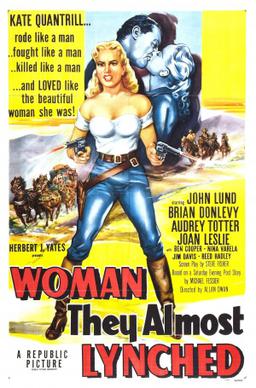
Woman They Almost Lynched is a 1953 American Western film directed by Allan Dwan and written by Steve Fisher. The film stars John Lund, Brian Donlevy, Audrey Totter, Joan Leslie, Ben Cooper, James Brown, and Nina Varela. The film was released on March 20, 1953, by Republic Pictures.

I'm from Missouri is a 1939 American comedy film directed by Theodore Reed and written by Duke Atteberry and Jack Moffitt. The film stars Bob Burns, Gladys George, Gene Lockhart, Judith Barrett, William "Bill" Henry and Patricia Morison. The film was released on April 7, 1939, by Paramount Pictures.
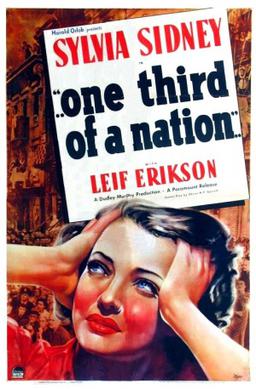
...One Third of a Nation... is a 1939 American drama film directed by Dudley Murphy and written by Oliver H.P. Garrett and Dudley Murphy. The film stars Sylvia Sidney, Leif Erickson, Myron McCormick, Hiram Sherman, the future director Sidney Lumet and Muriel Hutchison. The film was released on February 10, 1939, by Paramount Pictures.

There's That Woman Again is a 1938 American comedy mystery film directed by Alexander Hall. It is the sequel to There's Always a Woman, released the same year. In both films, Melvyn Douglas stars as a private investigator whose wife involves herself in his work. Joan Blondell played the wife in the first film, but that role went to Virginia Bruce in this one.


















